Published Apr 24, 2020
Star Trek Helped Me Stop Dreading the E-Word
How the fandom's passion, encouraged a professor to embrace his love of science
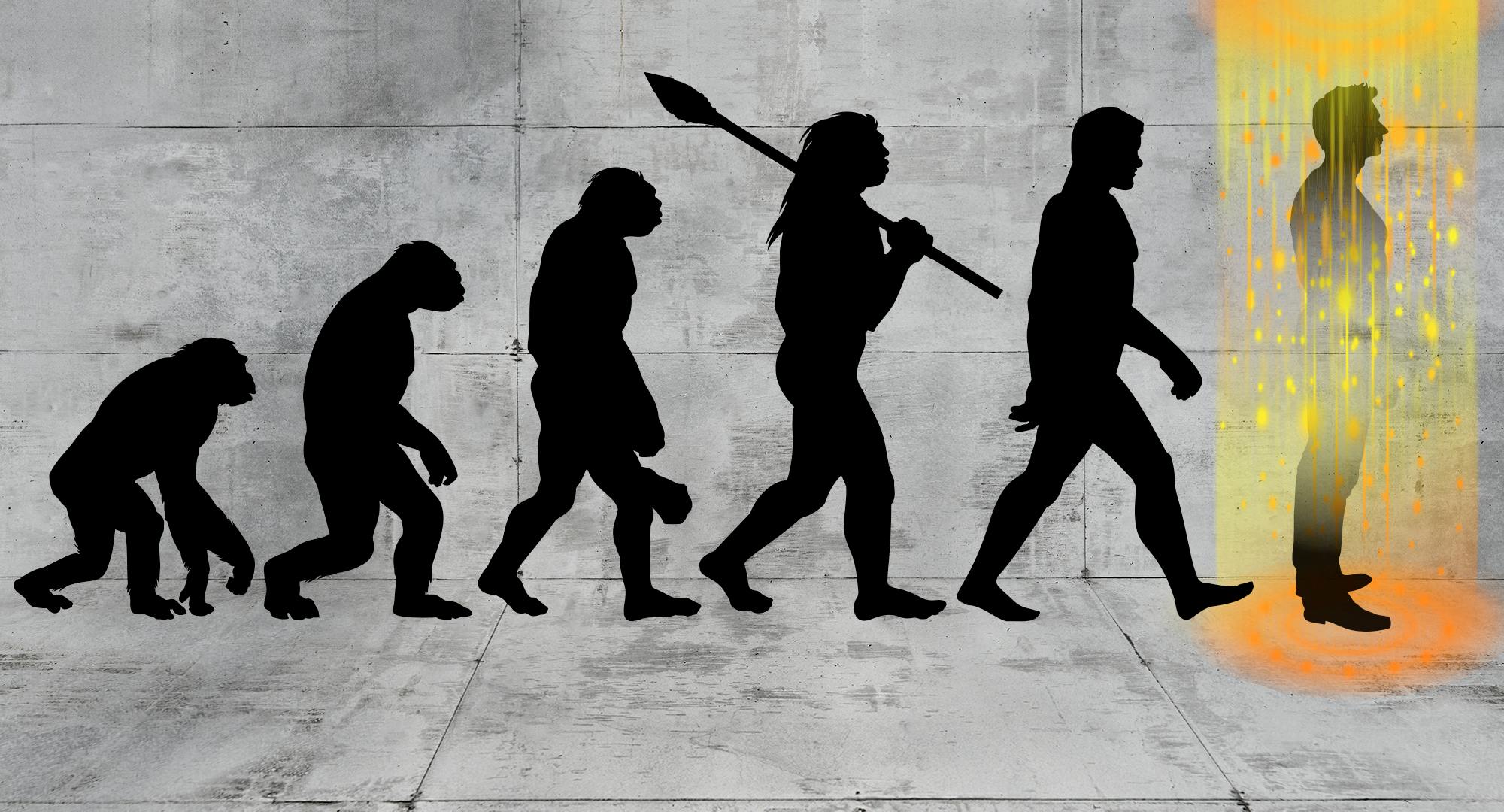
StarTrek.com | ShutterStock/Android Boss/Andrey_Popov/Uncle Leo/optimarc
Talking about science in Star Trek has reminded me of people's love of science and learning
When a stranger on a plane would ask me what I taught at my university, I used to avoid the "E word." You see, for the last 20 years, I've taught evolution to college students. My students are bright, talented, and destined for successful careers. However, college students can't just take whatever classes they please — there are breadth requirements, major requirements, etc. As such, students take some classes to fulfill requirements rather than because they're excited about the material covered, and evolution was not usually a favorite topic in a major of mostly pre-medical students. Hence, sometimes I found it tough to keep up the energy in the classroom. Further, since we professors learn in part through questions and engagement with students, a dip in energy by the students means that we learn less, too.
A Timeline Through the Star Trek Universe
Complicating things further, teaching and conducting research on evolution is sometimes considered controversial in the USA outside academic circles. The most fundamental insight within this field of study (and arguably within all of biology) is that all life is literally "related": if you go back hundreds of millions or billions of years, we humans share ancestors with flies and grass and bacteria. While this scientific fact poses no threat to religious faith, many people in the US still actively oppose evolutionary concepts. A Gallup poll released in 2014 showed that 42 percent of Americans believe that humans appeared on Earth in their present form, 31 percent believe that humans evolved but with divine guidance, and 19 percent believe in human evolution without divine guidance. To put that last number in context, a 2019 YouGov survey found that 20 percent of Americans believe that ghosts "definitely exist."
While I have not personally encountered strong pushback to my biology courses, I do have students express discomfort to me about evolution even after I stress the compatibility of the science with their faith. This discomfort further complicates my ability to teach them.
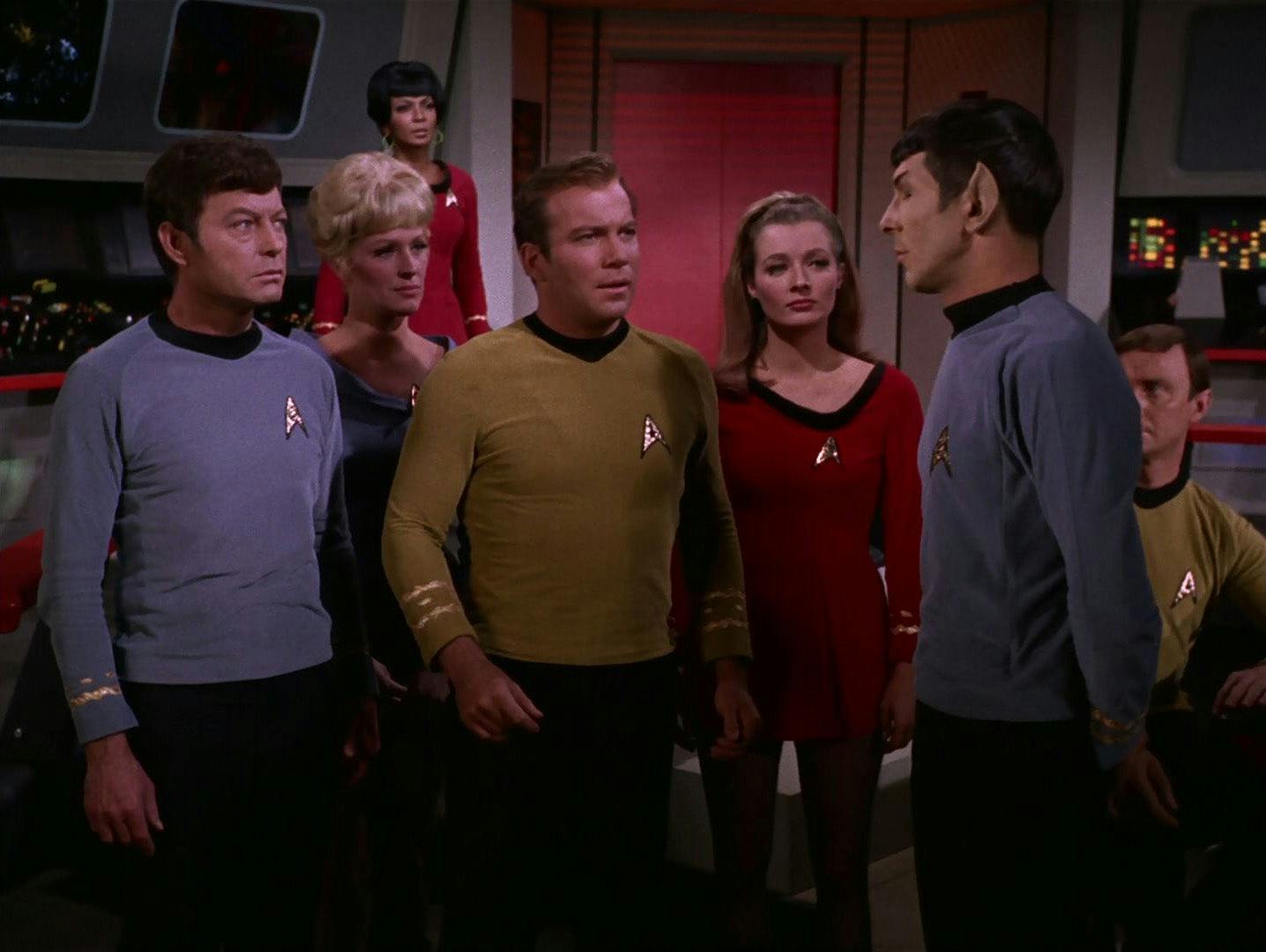
StarTrek.com
These issues weigh on me as an educator, but Star Trek has always been my reprieve in part because of its active embrace of not only discovery, exploration, and science, but also the concept of evolution in particular. The Original Series episode "Return to Tomorrow" has Dr. Ann Mulhall say, "our studies indicate that life on our planet, Earth, evolved independently." TNG also had multiple episodes reinforcing evolutionary principles. For example, "The Chase" depicts Earth as seeded with precursors to all its life four billion years ago, and "Genesis" has the crew purportedly de-evolve into ancestral forms. While there are scientific problems with these episodes, they nonetheless depict scenarios unambiguously supporting common ancestry of life on Earth. Similarly, Voyager’s "Distant Origin" presents a thinly veiled critique of resistance to evolution and common ancestry using an example on another world with another species. These episodes present great stories and engage viewers in scientific thinking.
Recently, my Star-Trek-related experiences have re-energized me as a college professor by showing me new ways to engage people in science and learning, and they've helped me become better at my job. I presented my first talk teaching real evolutionary concepts using examples from Star Trek at Dragon*Con, a large pop-culture convention in Atlanta, in 2016. I was shocked when the room nearly filled with roughly 200 convention-goers. I was concerned that the audience would find the topic boring or threatening to their identities. In fact, the opposite was true: the audience was riveted by the connections between real science and their fandom, and I got many insightful questions and lots of positive feedback more generally. They were very eager to learn, and I was thrilled to learn more myself alongside them.
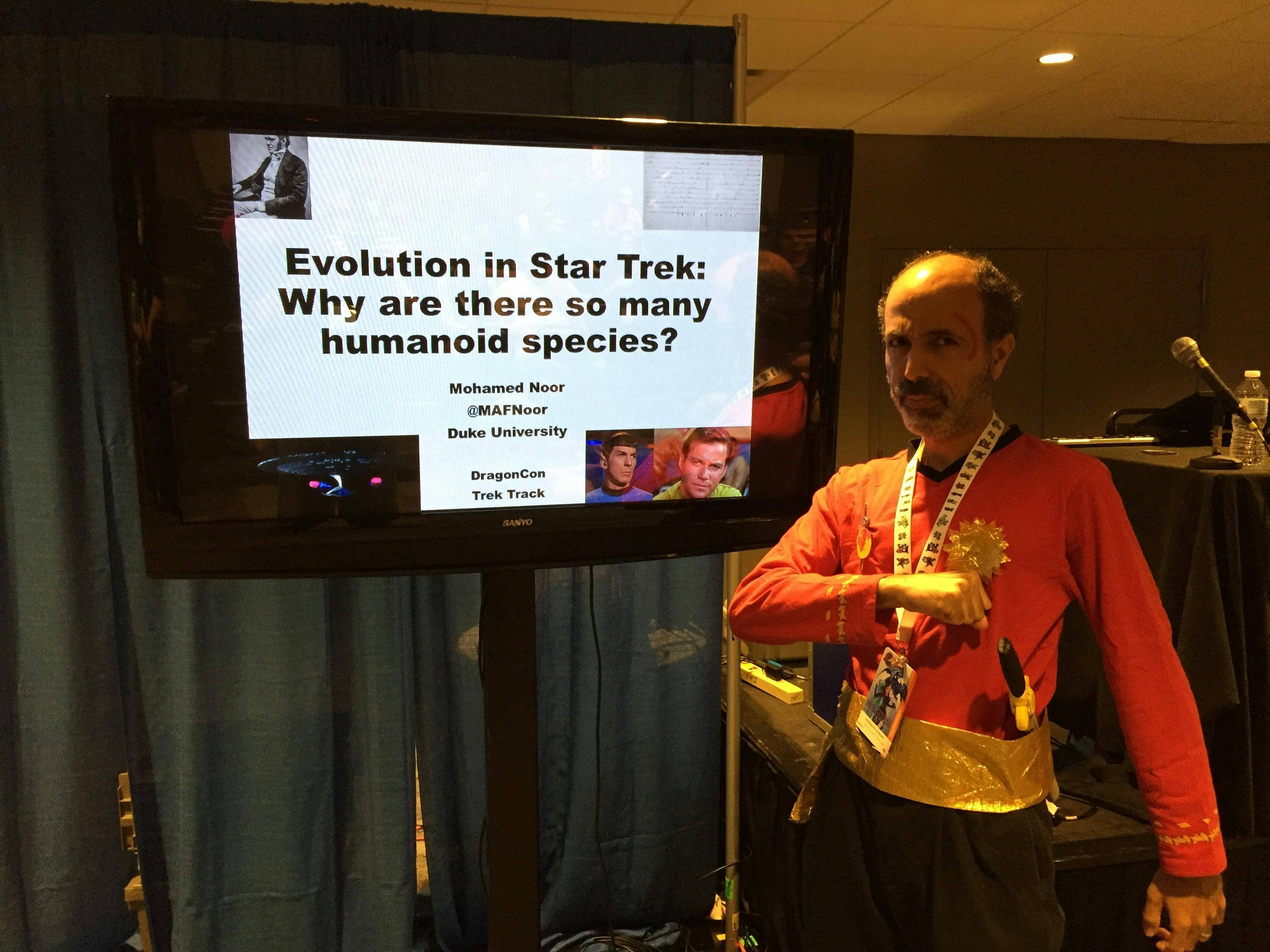
StarTrek.com
That convention talk started me along a personally defining journey. I volunteered to give talks at many other conventions, sometimes solo and sometimes alongside friends and fellow science-in-science-fiction speakers like Dr. Erin Macdonald and Prof. Eric Spana.
Even outside convention outlets, people love connecting real-world science with their fandoms. I also got invitations to give public outreach talks using Star Trek at other venues, such as universities or the Smithsonian Institution. A university press approached me to write a book, and with their help, I wrote Live Long and Evolve, extending many of my talks on genetics and evolution using examples from Star Trek. While it's far from a "best-seller", I've been elated that it has received positive reviews and feedback from many fans. Just in the past year, I was fortunate to give educational talks both at Star Trek Las Vegas in August, 2019, and on the Star Trek Cruise IV in March, 2020.
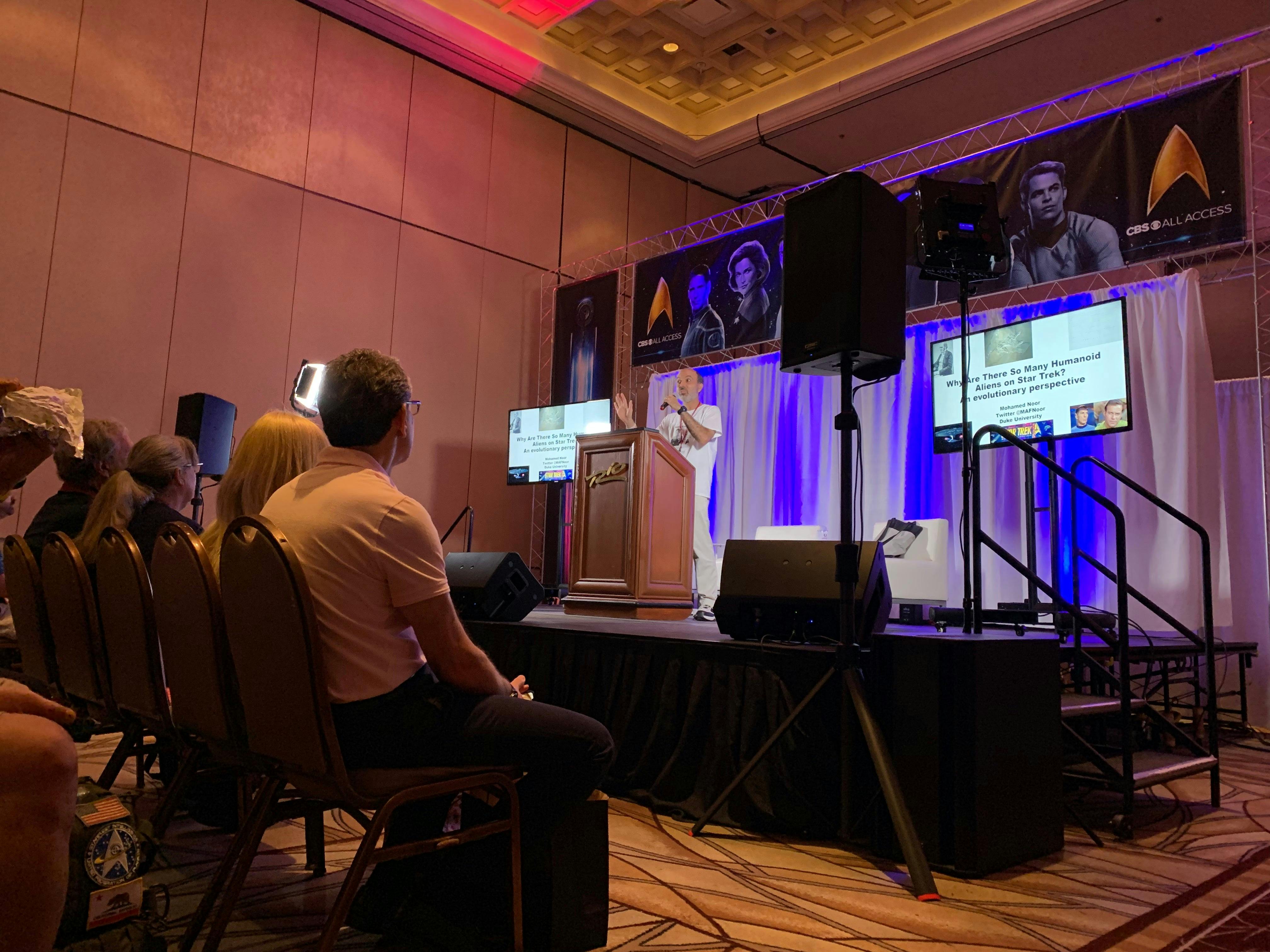
StarTrek.com
Although I have consistently enjoyed teaching and conducting research on evolution, my interactions with Star Trek convention-goers further rejuvenated my love for these topics by reminding me how much other fans love science and giving me new ways to engage them. Science talks at conventions are understandably placed in smaller rooms than Q&A panels with actors. However, anyone who has gone to such science talks can attest that, unless they are at an inconvenient time, they are often "standing room only" with convention-goers! The recent Star Trek cruise passengers were especially delightful. This cruise is a vacation for the passengers, and activities on the ship extend very late into the night. Still, I hosted breakfast "science office hours" starting at the obscenely early time of 8:30 in a corner of the buffet restaurant. I would arrive 30+ minutes early to grab some breakfast, and a group of people would be already waiting to chat science with me and with each other. The office hours always went over-time, too, since we all had so much fun chatting science.
These experiences also illustrated to me that so many Star Trek fans are, in essence, a "learning community", eager to explore new subjects and to seek out new knowledge and insight.
Nearly every episode of Star Trek reinforces this kind of convention-goer behavior: how often did Spock analyze new species solely to understand them better? How often did Janeway side-step the straight-line voyage back to the Alpha Quadrant to explore a new spatial anomaly? How often does Tilly get excited about devising creative solutions to problems by leveraging science and math?
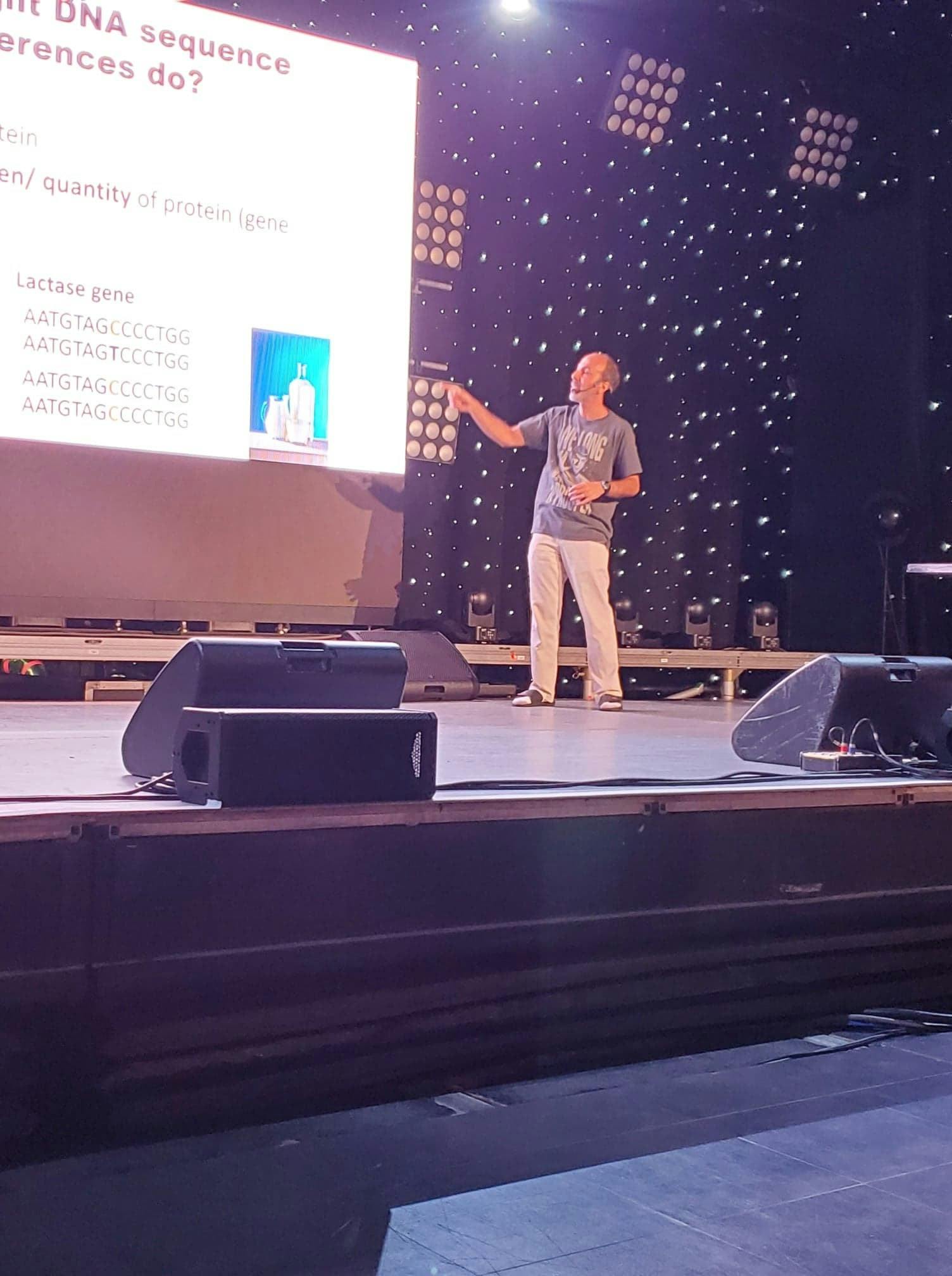
StarTrek.com
This rejuvenation and suite of new experiences helped me engage better with students at my university. Prof. Spana and I began teaching a class called "Biology in Popular Science Fiction TV and Movies" together. We use it to teach fundamental biology concepts but leverage the narratives portrayed in stories that the students find more compelling and memorable than dry textbooks of facts. I also use my book for a non-majors class ("Genetics, Evolution, Star Trek") in which we literally watch bits of Trek as introductions to discuss the underlying real-world biology.
While I have always loved watching Star Trek for entertainment, these Trek-related experiences have been a turning point for me over the past five years in all facets of my life, both in and out of work. I could not be more grateful. I’ve moved on from avoiding "the E word" when a stranger asks what I teach. Now I get "oohs" and "ahhs" when I mention that I connect Star Trek to teaching evolution at my university, and I couldn't be prouder.
Mohamed Noor (he/him) is a Professor of Biology and Dean of Natural Sciences at Duke University, and recently became a science consultant for the Star Trek Universe. He can be found on Twitter at @mafnoor

